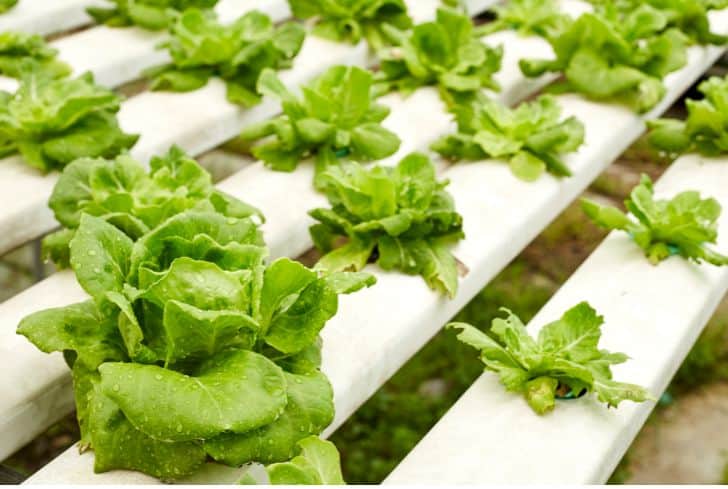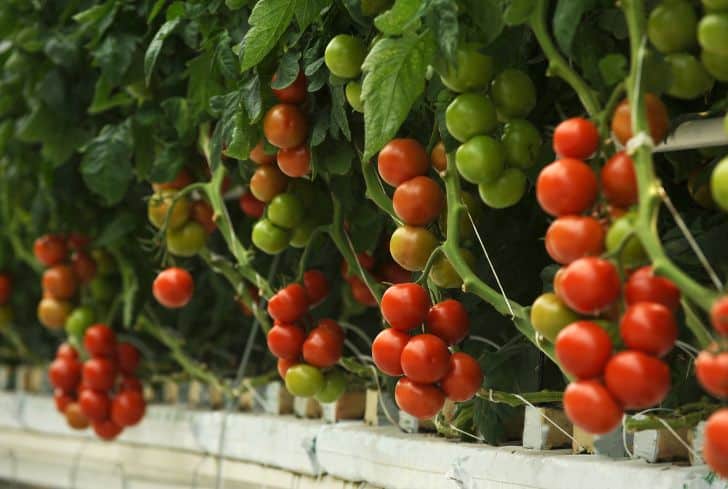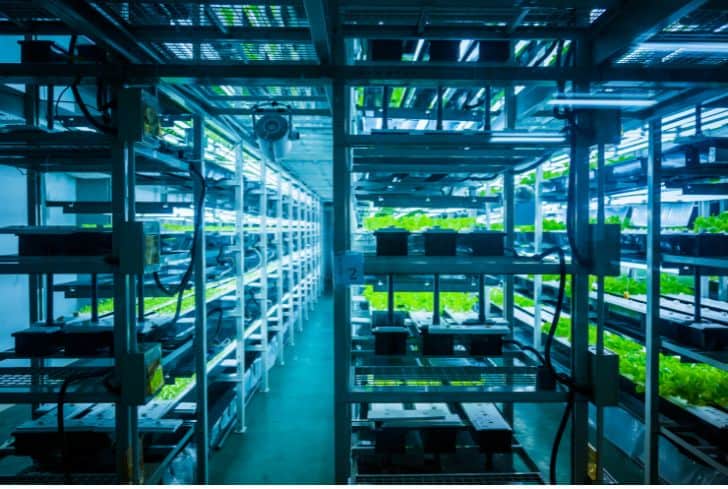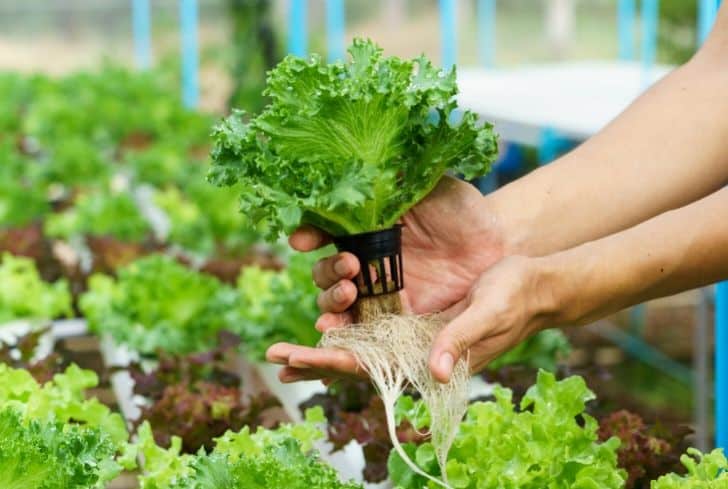With more people embracing healthy lifestyles, there’s been an upsurge in producing crops locally. Hydroponic systems address this concern by facilitating the production of healthy, organic, and local crops right from the comfort of one’s home.
But what exactly is Hydroponic farming all about? What pros and cons does it come with?
Well, these are some of the many questions we will answer over the course of this article.
Hydroponic Farming in a Nutshell
In the simplest of terms, Hydroponic farming is a form of soil-less gardening. The process involves growing a bunch of healthy plants without using soil.
In this form of farming, the soil is substituted by water. So, all your plant needs is proper water and sunlight to thrive.
The process is quite simple, and since soil isn’t involved, the method is generally low-maintenance and hassle-free.
Advantages of Hydroponic Farming
If you’re considering the possibility of Hydroponic farming, here are a couple of benefits that you are likely to achieve:
1. No Soil Involved
Since Hydroponic farming involves growing crops without soil, it is an ideal option for anyone who has limited access to land.

That’s why this form of farming was used in the mid-nineties for supplying fresh crops to the troops in the Wake Islands, a distant arable area located in the Pacific Ocean.
Recently, astronauts in NASA have expressed the idea of using the method to grow crops in space, deeming it as the farming method of the future.
2. Optimal Use of Location
Since every requirement of the plant is provided for and duly maintained in a structured system, Hydroponic farming can be performed anywhere.
So, if you live in a space-crunched apartment, you can always consider Hydroponic farming, as with this method you can have the plants grown even on your balcony or even bedroom.
That’s because, unlike conventional farming where the plant roots expand and thoroughly spread out to search for food and oxygen levels in the soil, the roots of plants grown using this method have everything they need within their reach.
In other words, with Hydroponic farming, the roots of the plants remain submerged in a tank of oxygenated solution with direct contact with the vital minerals. That means you can grow multiple plants in proximity without having to worry about space.
3. Complete Control Over Climate
As with greenhouses, Hydroponic growers have absolute control over the climate. They can adjust the temperature, the intensity of light, and the humidity levels as per their requirements.
So, in a way, if you practice Hydroponic farming, you can continue growing crops all year round without worrying about the season.
This is especially advantageous to farmers growing crops for sale as it lets them directly control the growth of their plants, something they usually don’t get with the conventional way of farming.
4. Saves Water
It may sound contradictory, but plants grown in Hydroponic systems use up to 90% less water than conventionally field-grown plants.
That’s right.
You see, the fact that they remain submerged in water doesn’t mean they use much of it. Unlike the traditional way of farming, Hydroponic is a closed system. In other words, water remains within the system since there’s no soil for the water to seep into, as with regular farming.
Plants take in their required water while the excess is captured and trapped back into the system.
Water loss, therefore, occurs only through two pertinent forms:
- Evaporation
- System leaks
Of course, if you have an efficient Hydroponic setup, the only way your system can lose water is through evaporation which really isn’t as much compared to the other two ways of water loss.
5. Optimal Use of Nutrients
When it comes to Hydroponics systems, you have absolute control over the nutrients required by the plants.
Even before proceeding with farming, you can check what kind of nutrients your plants need and then mix particular amounts of those nutrients with water at different stages.
6. pH control
Since every mineral is directly in touch with water, you can always manually adjust and tweak the pH level when required. This will ensure that the plants receive optimal nutrient intake.
7. Faster Growth Rate
Another major benefit of the Hydroponic system is that it ensures a faster growth rate. Here, you are entirely in control over the environment required for the plants’ growth.
That means you have control over every parameter, like the temperature, the surrounding light, moisture, and, most importantly, the nutrients. The plants will be placed in an ideal condition, and nutrients will be sufficiently provided so that they can directly contact the root system.

This way, plants won’t waste their valuable energy looking for diluted nutrients submerged deep within the soil. Rather, they can almost entirely be focused on thriving and boosting the production of fruits.
8. Zero Weed
If you’ve tried conventional gardening, you probably know how irksome weeds can get. Weeding is one of the most exhausting tasks for gardeners, and the majority of them — if not all — can confirm it.
Now, one of the greatest benefits you get as a farmer from Hydroponic farming is that you never have to worry about weeds.
Weed is entirely associated with soil, so going soil-less brings the chances of getting weeds in your Hydroponic system to zero.
9. Fewer Pests and Ailments
As with weeds, removing soil ensures that your plants are not as susceptible to soil-borne pests like gophers, groundhogs, or a bunch of birds. You can also protect them from ailments like Fusarium and Rhizoctonia.
10. Fewer Insecticides and Herbicides Involved
Since Hydroponic farming doesn’t attract weeds and pests like regular farming, you don’t need any pesticides or herbicides for the plants.
This is good news, especially if growing food crops. Failure to use pesticides and herbicides means that whatever you harvest from your Hydroponic system is entirely safe from harmful toxic chemicals.
11. Time-Saving Process
Since no time is needed to till, cultivate, weed, or spray your plants, Hydroponic systems are real-time-savers. This makes them an ideal form of farming for passionate gardeners who don’t have enough time for the conventional way of farming.
Plus, since Hydroponic farming avails everything necessary for the plant to flourish, plants take much less time to grow compared to the traditional way of farming. That means you get to harvest way earlier than you would using the regular way of farming!
12. Relieves Stress
As with any other form of farming, Hydroponic farming is one of the most stress-relieving hobbies. It gives you that one rare chance to reconnect with nature.
So, when you are worked up after a tedious day at the office, you can always come back home to your little Hydroponic garden where you rear and grow plants from scratch.
Disadvantages of Hydroponic Farming
As with any other farming method, Hydroponics comes with its own set of cons. In the following section, we will discuss some of the disadvantages of Hydroponic farming in detail:
1. Time Consuming
In the previous section, we said that Hydroponic farming is time-saving. That’s correct.
But then, it can also be time-consuming.
Well, let me explain.
You see, unlike plants grown in soil that you can ignore for weeks and sometimes months, and they’ll be just fine, such can’t be said of plants grown in the Hydroponic system.
That’s because, unlike normal farming, where nature and soil help balance everything, you’re in total control of everything regarding the Hydroponic system.
That’s to say; you have to play the role of ensuring that the plants have access to nutrients, light, water, and all other elements it needs for growth. All this needs time, which is why Hydroponic farming can be time-consuming.
2. Requires Some Expertise and Finesse
The process of Hydroponic farming depends on a range of equipment that requires proper expertise. Unless you know how to operate this equipment, the plants won’t thrive or flourish as well as you’d want them to.
Even the minutest mistake can affect plant growth, sometimes entirely destroying your Hydroponic system. That’s why it is extremely important to familiarize yourself with the equipment and techniques involved in this process of farming.
3. Risks Of Water and Electricity
Two major factors in Hydroponic farming are electricity and water. So, unless you have adequate water or stable electricity, the Hydroponic system won’t thrive well.
In addition, you will also need to stick to proper safety precautions to avoid impairing the plant’s condition at different stages of growth. All these are things you seldom ever have to worry about when doing regular farming.
4. Threats of System Failure
If you are using electricity to manage your entire Hydroponic system, you must take precautionary measures during power blackouts or dimout.
In a prolonged power outage, the disconnection from power can negatively affect the plants, sometimes causing irreversible damage. That’s why it’s paramount to consider the power factor before rolling out a Hydroponics project.
If you have issues with power around your area, it would be best to work with an off-grid hydroponic system. This type doesn’t require electricity and is as convenient as the power-driven systems as you can have it either indoors or outdoors.
5. Debates Over the Organic Nature
Over the last couple of years, there has been significant debate and deliberation on whether Hydroponic farming is indeed a certified organic farming method.
Many farmers have questioned whether plants grown through Hydroponic farming can be certified as organic as they do not receive the microbiomes available in the soil.
However, It is worth noting that you cannot expect any farming method to be perfect. As long as the method works and the outcome is safe for human consumption, that’s all that really counts.
With Hydroponics, people across the globe have produced plants like tomatoes, lettuce, and other leafy vegetables over the last decade.
Countries like Australia, the US, and the Netherlands have already performed and succeeded in this mode of farming. At the end of the day, it has produced food for several thousands of people.
6. Expensive
Unlike conventional soil-based farming, Hydroponic farming involves expensive equipment (especially in the initial setup). Regardless of the kind of system you plan to build, you will require containers, high-quality lighting, an accurate timer, and quality nutrients.

Once the initial setup is done, that’s not the end of it. You have to incur recurring costs on the nutrients and electricity. So, if you are not ready to shell out a heavy initial expense, this may not make the ideal go-to option for you.
7. Low Return on Investment on Large Scale
If you already keep up with the updates regarding agricultural start-ups, you’re probably familiar with the costs involved in Hydroponic farming. It is important to note that Hydroponics is an excellent advancement in the agricultural sector.
However, if you’re planning to perform this farming on a large, commercial scale, the return on investment won’t be as high. That is primarily because of heavy initial expenses and unsteady profits. As of now, it is not very convenient to come up with a proper, profitable plan to urge farmers to try Hydroponic farming commercially.
Wrapping-It-Up
Hydroponic Farming is an excellent farming method whose benefits outweigh the cons. Since you are now familiar with the pros and cons of Hydroponic farming, consider giving this novel farming method a try. With the many benefits it comes with, the process will undoubtedly meet and exceed your expectations, and it’s even fun!

